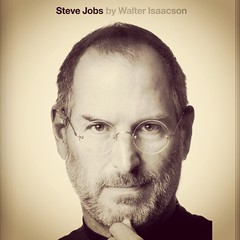So… I finally finished reading the mammoth, 571-page Steve Jobs biography by Walter Isaacson, former editor of Time magazine.
It took me about two weeks and I’m already missing the experience (UPDATE: the blog post sat for an additional 4 weeks…).
Talk about living vicariously through someone! Worth reading just for the lessons in persuasion, but that’s not why I’m writing about it today.
See, I’ve been somewhat irked by the some of the comments already made about the book, and I think some people are seriously misleading the genius of Steve Jobs.
I’ve seen blog posts such as ‘To be a better manager, be a jerk like Steve Jobs”, and more along those lines.
That’s understandable since the book devotes a good deal of real estate to describing how other people experienced being and working with Jobs. And invariably they did mention his personality as, well, not so easy to get along with.
However. Come ON! The last thing we need today is a bunch of deluded would-be mastermind mid-level micro managers demanding their assistants deliver their lattes JUST SO or there’s hell to pay.
Jobs may have had a difficult to understand personality for many, but I think that’s well beside the point. Let’s look a little deeper than the surface, and perhaps find something of value.
Every single human being is flawed. As was Jobs. But the other side of that coin is, it can also work to propel out the particular genius of the person.
So now, I’d like to offer a few key observations and takeaways from the Steve Jobs authorized biography right now.
Let’s have a go.
- Sensitivity is a double-edged sword. By all accounts, Jobs was a super sensitive individual. Sensitive to beauty, elegance, and well, not just excellence but perfection. And those who didn’t share his views and predilections?
“He could stun an unsuspecting victim with an emotional towel-snap, perfectly aimed.” 🙂
Whether this sensitivity was borne out of his beginnings or not, it’s clear this was a major paradox in his case. Couldn’t have one without the other. - Getting organizations to work together as a whole. Let’s be clear: it doesn’t matter who got Apple back from the brink, the sheer fact that it happened would have made a hero out of anyone. But that it was Jobs himself, not so much known by his management prowess by that time, is even more impressive.Think about this: Why is it… that a behemoth like Sony couldn’t join their ranks enough to put together the technology, content and services the way Apple did? Let alone Microsoft, especially since they had such a head start with the tablets. Amazon has a shot at it right now. But this chapter was one of the big revelations: how Jobs very deliberately, practically forced the various departments to work together. Some see it as his wanting to control everything, but fact is it also lead to the big difference in operation compared to all of Apple’s rivals.
- Integrated marketing creates empires.This is where the integrated operations approach really pays off.Few realize this, but the way Apple used the iPod was not only to create a market where there was none, the huge advertising spend also served to sell a TON more Macs and improve the visibility and cool factor of Apple as a whole. They could literally afford to outspend the competition hundredfold!The fact that all of Apple’s products and services are all designed to work together seamlessly (compare that with the Android hodgepodge) allows them to leverage advertising in a way that benefits all product lines. Genius.
- Design is NOT the same as veneer. When a product is designed all the way through with a single unifying idea, the soul of a product gets communicated through the entire product. This is something Jobs championed at Apple, and you really don’t see that much at all in business, save perhaps the best of the automotive business. Having worked a long time in the tech industry donning many hats, I can wholeheartedly agree with this quote from the book:
“Producing technology requires intuition and creativity, and producing something artistic takes real discipline.”
Okay, I’ll admit it: I ran out of steam. I could talk about this book and these subjects all day long, but adding more to what you’ll already get by reading the book is tough. So take my word and read it. It’ll take a while, but the second half especially will be well worth the effort.
To sum up: whenever we come across a great, brilliant man (or woman), you can be sure they always embody a paradox of some kind.
In the case of Steve Jobs, apparently the paradox was his uncompromising love and sensitivity to beauty, elegance and excellence in creating technology that serves humanity the best… versus the way this same sensitivity came across as difficult behavior.
He didn’t mean it, but he also couldn’t help it, as he’s quoted as saying many times. Let’s leave it at that. May he rest in peace, and may Apple live on.



People reacted to this story.
Show comments Hide commentsHi Juho,
I was working for Vodafone whenever Apple started making their comeback. For someone in the industry, I have to say that I didn’t see what all the hype was about. The tech-geeks of the time, however, knew exactly what was happening. I think what Steve Jobs ultimately done was created a brand that stood out; and one that remained consistently true to itself. As you said, Apple simply done something that Microsoft could have done if there had been more interdepartmental cohesion within the corporation. It seems like a no-brainer – but to actually achieve it? You have to respect the guy.
Thanks for the comments, Frank. Yeah it’s quite a feat to achieve such unison style operation in a huge company, something I’m sure many will try to copy now. Microsoft though, I think they were just designed to work differently, distributed across the industry instead of being a product driven force like Apple. All have their place…
I think that other companies mostly brought decisions based on logic and previous events, so their decisions were more like computed ones, while apple was thinking differently, and hired a good designer that looked for solutions and new ideas in what other companies took for granted… For example they tried to make laptops out of new materials while others took for granted that they should make them out of the same material.. Not that there is anything wrong with plastic if you do it right but as for me i can still see some flaws in apple’s products that could be fixed but they are way ahead of their competition from what i have seen, and one perhaps the most important asset as Steve was saying is their OS (at least for me)….
Yeah, I think you’re on the right track there. In other words, Apple put a lot more effort into innovation than others, while only rolling out mature features. That’s pretty much a winning combination if you ask me.
It was maybe two years ago when I began reading about Apple and Steve Jobs more. The thing I took away from the articles was his difficult behavior, the way he would berate people and his over sensitivity. A few months before his death I began reading more articles that featured on his pure genius. I guess I like reading about his genius more than his temper. And yes, may he rest in peace.
Brian – then you’ll know what to expect with the biography. The first half is mostly painful reading, but the second half shows the genius shining through brightly.
My next read this. I did some research on Steve Jobs and Apple Computers (as the company was known in 1984) back in 2003 during my university days. It was actually Steve Jobs and Jef Raskin that introduced the first Graphical User Interface to the world through their 1984 Macintosh.
Jobs was a pioneer. He gave us “new” stuff. Stuff we have never seen before. Everyone knows about the iPod, but Steve’s biggest innovation was bringing to market the earliest version of what we now know as “Windows”.